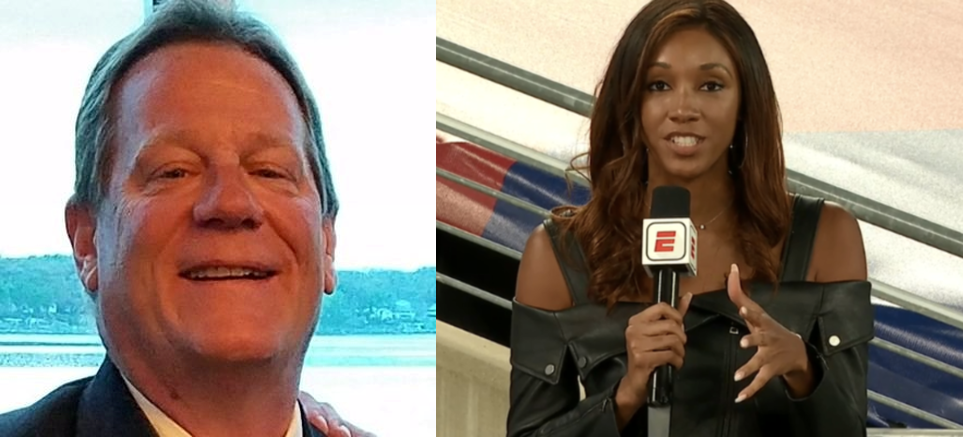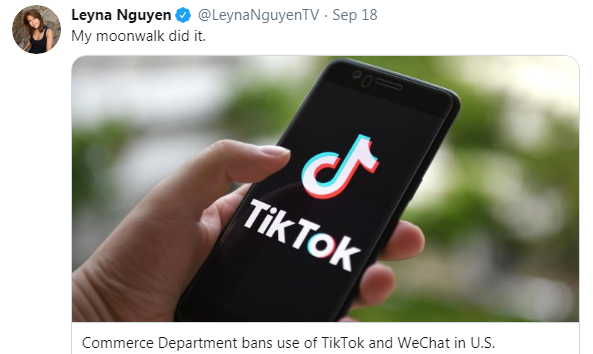
Today’s guest post from Lori Lewis reminds me of that “6 degrees of separation” meme. I know – in some way – all the players in this drama.
It all started a couple weeks back when Chicago sports radio loudmouth Dan McNeil was relieved of his duties on WSCR/The Score following a gratuitous, sexist tweet about ESPN sideline reporter Maria Taylor. Dan was once part of a morning show on WDRV, a station I consult. Yeah, I know the guy.

Then I get sports radio consultant Jason Barrett’s promotional email, featuring a story by controversial sports radio host and journalist, Jay Mariotti. I don’t know Jay personally, but back in the early ’80s, one of his first sports reporting jobs was for The Detroit News. I believe that is where he began to find his voice. “To Tweet or Not To Tweet” reached the conclusion that Twitter is a time and brain suck – best used for promoting other assets, like shows or columns. As I mentioned earlier, I don’t personally know Jay, but I’ve been reading his columns and listening to him for a long time now.
Of course, every year our Techsurvey reveals how sports fans live to be on Twitter – and the importance of engaging on that platform. But at Jason’s great conference earlier this year in NYC (pre-COVID, of course), I got to watch one sports commentator after another talk about the combative nature of the genre – and not just the games athletes play – but the jousting that goes on between writers, show hosts, and the jocks themselves. It seems like everyone’s taking shots at one another, and there’s always a dispute brewing.

This felt like a blog topic about the value of social media to radio hosts – especially in the sports world. And then I quickly concluded that social media maven, Lori Lewis, should be the one to write it. Yes, Lori worked for Jacobs Media for several years, before joining Cumulus, and stepping out on her own in 2019.
True confession: So, I have a connection with the entire cast in this controversy, except for Maria Taylor. But I feel like I’ve gotten to know her a bit better since this all blew up.
Here’s Lori’s response to Jay – and perhaps everyone toiling away in sports radio today wondering whether social media is worth the effort – and the risk. – FJ
For well over a decade now, social media has offered the ability to congregate online, form communities, and have real-time dialogue; giving folks a bigger voice.
But with the freedom of ‘tweeting’ comes responsibility. And it should be no surprise if and when you are judged by others or lose jobs and opportunities because of your digital debris.
Earlier this month, you may have seen the headline we’ve seen all too often:
“Radio Talent Fired Over Degrading Tweet”
At this point – perhaps I’ve become numb to the storyline.
I didn’t write about it or have any real reaction over it.
After all, losing jobs over irresponsible tweets has been happening since maybe 2011?
But when Fred shared an article with me about that latest firing – I had a reaction I’ve never had before.
The piece calls social media “a brain suck.”
The author, Jay Mariotti, wrote, “Rather than pummel social media with non-stop postings — and lose a job for an inflammatory comment — media professionals should use Twitter only as a billboard for their work and try what I’ve done: downsizing.”
At first I wanted to defend social media.
I wanted to say his position doesn’t even make sense.
I wanted to say the essence of social media is not to push our content on them – but to raise our capacity to connect with and have actual (fun) back and forth with one other:

I wanted to say if you use social like a troll – you’re going to get trolled back. Everyday people now have a voice equal to radio talent – which is tough for mud slingers to accept.
I wanted to share what the true spirit of Twitter is all about – explained years ago by another sports personality/commentator:

I wanted to share the everyday humor that plays out every day in social media, helping us smile as we navigate through a pandemic and divisiveness:

But you know what?
Maybe Jay is right.
Get off social media.
Or worse – abuse it as a push platform; watch how well that works out.
For some reason, social media is often viewed as an “unrestricted playground.” Platforms have become a gateway for an increased lack of civility and greed, pushing their cybernated slop on us.
Yet impressions are formed every time we communicate socially.
The better advice is simple:
Don’t get caught up in the heat of the moment.
We are walking around with “live mics” in our pockets.
Filters need to be on at all times.
It is not “social media’s fault” when you do something inappropriate.
It defies logic to blame the platform. That’s like blaming the microphone when you say something unacceptable on the air.
Understand the implications of your words.
Stop using social as a push platform.
You create a self-involved, void of interaction reputation – which becomes fatiguing and forgettable.
If you can’t keep social media in perspective, build discipline towards showing basic human decency online, enjoy engagement and find outside hobbies so you’re not living on Twitter – you’re right, get off social media.
Lori Lewis can help you make sense of your social media strategy. Contact her here.
- What To Do If Your Radio Station Goes Through A Midlife Crisis - April 25, 2025
- A 2020 Lesson?It Could All Be Gone In A Flash - April 24, 2025
- How AI Can Give Radio Personalities More…PERSONALITY - April 23, 2025




One slip can be a noose. “Loose lips sink ships,” doesn’t quite cut it. This is not a leak. Social media is a loose cannon on deck in the “woke” era. Also fraught with trap doors, political posts which can take you out of consideration for gigs. Any side you pick will have responsible minds with the opposing point of view. Lori’s “Live mic” analogy is completely on point.
And that’s exactly why I asked her to guest write today’s post. Thanks, Ed.
Right on, Ed.
Social is a fantastic outlet; incredible moments and connections have been created because of it.
But with anything in life, nothing good comes from extreme use and that includes incivility – or simply pushing yourself on us. Nothing more boring than people who push their voice, push their content, etc… on us without any civil back and forth. 🙂
Fred, thanks for sharing Jay’s insights. Great job by Lori as well examining the issue. As someone who uses social daily to promote content and engage with industry folks, I’ve changed my tune too over the years. I’m not sure a talent gains more than they potentially lose by offering rapid unfiltered thoughts on social platforms anymore especially as these locations start to convert into the editorial police. The old argument used to be ‘it helps your ratings’ and though that may be true at times, I can point to many examples where stations or shows aren’t performing yet have people living each day on social. I’ve asked a few execs about this in the past and the usual response is ‘talent have to be active where fans are, it builds your profile, and being involved on social media keeps you relevant in in the daily conversation’. I get that side of it but we also know the airwaves make your profile valuable too, most sales teams aren’t selling the social space, hosts aren’t bonused from it, and even the rules of what constitutes being active on it are grey. If I tweet 3x per day promoting my show does that make me active? Am I supposed to engage in conversations? If so, how many? If a listener trashes me or my family am I allowed to respond how I see fit? Will the company have my back when I’m dealing with a barrage of lunacy? We ask our talent to adjust to on-air rules but yet in the social space it’s everything goes. That creates problems. Does a programmer really want to lose one or two of his best talent simply because they tried to deliver a joke or opinion outside of their show on social that went wrong or was received differently than intended? If they make that mistake on the air more times than not it’s forgotten in 5 minutes. In social, things are frozen in time, shared repeatedly, and many are looking for a reason to pile on. I saw it again this past weekend when Doug Gottlieb raised a question about Maria Taylor’s voting credentials after she left Anthony Davis off her NBA ballot. We haven’t even touched the mental health aspect and how some of our best talents are affected daily by accusatory behavior and out of bounds reactions from people that don’t even listen to them or live in their area. The beauty of radio and even email, we can limit what our best performers are exposed to. On social, they see everything and it does take a mental toll. I get that some personalities have made egregious errors on social platforms and paid the price for them, as they should, and those few examples don’t represent the whole. But the question I keep coming back to is ‘what’s really in this for the talent’? If our future answers remain ‘it helps your ratings’ and ‘it’s where people are’ we’re going to have more personalities pushing back because there’s a lot on the line to lose and being accessible 24/7 doesn’t provide enough of a reward. Appreciate you advancing the conversation. — JB
Thanks for this, Jason. As you know, I was doing a lot of listening at your conference, and think about many of your guests and what they had to say about the competitive, intense nature of the game they play every day on the air. You brought much perspective to this issue at your conference, and by publishing Jay’s article. Here we are at year 15 of social media, we’re still debating its value vs. its costs (potential and real). I suspect we will continue to do so. Thanks for this, and I’m wondering what music personalities and programmers have to say.
Good thoughts, Jason.
We win when we invest in our people. And that means being a solid enough leader to know how to teach balance in the social space. I work with talent who actually someone else read the comments & reply in the voice of the talent.
Heck, I even do some of the acknowledgement in the talent voice to protect them from weirdos and heat of the moment.
Balancing time spent on social – a plan to protect those of us who are thin skinned – and perspective is what’s never taught in this space.
It’s too bad – because those I get to work with every day actually like social now – because of the perspective given. Anyway – this is a great topic of conversation that no doubt will continue. : )
Once upon a time, hosts were paid to have an opinion. Because opinions get reactions from listeners. Reactions get more ears and ratings. Once upon a time a good programer would answer a complaint call with, “Thanks for the call. I mean that sincerely. Because your complaint only shows us that the host is doing their job. Their job is getting a reaction, and your call proves that they are doing just that. Please call back any time.” (Click)
Dan McNeil commented on her clothes. For gods sake. I think he said something like “that outfit looks like a hooker would wear it.” Oh my god! anathema! Gone are the days where Dan would get maybe a slap on the wrist and in the GM’s office a pat on the back for all the attention he is bringing to the station.
The real issue here isn’t an ‘open mic’ it’s management that has caved to the kindly inquisitors of the outrage mob.
Hi John!
Only for clarity – not debate because I hear you – here is the tweet that ended Dan’s up and down tenure by 670 The Score:
It was a picture of Maria Taylor and:
“NFL sideline reporter or a host for the AVN annual awards presentation?”
The AVN awards celebrate porn.
While we will agree to disagree – it’s about civility. There’s a difference between outrageous opinions on an athlete’s performance, contract cuts, etc…(the emotional rollercoaster a great host takes us on), and degrading a woman’s look. When a host has to go there – low hanging retweets and attention – maybe it’s time to go fishing and regroup.
I see, it’s not ok to comment on a woman’s attire. Gad we got that rule laid out. Now, how about all the other rules of what is acceptable and what is not? Could you please list them all! It’s important to know where all the lines could possibly be if a personality is expected not to cross them. Thank you. I look forward to the list.
Here’s your list of what’s acceptable, John Ford:
Decency
Civility
Dignity
Basic respect for one another.
We don’t have to like each other to be decent to one another.
“Decency Civility Dignity” as defined by whom? That is the question. It’s pretty tough being a personality when there are no clear lines drawn as to what you can and can not say on the air or twitter or wherever. When Carlin named the words, that’s one thing. Here we have vague concepts defined by no one all based on some sort of moral vagueness. It’s a new era of the prude.
And I’ll guarantee you one thing, the strategy of “Decency Civility Dignity” will never be a ratings winner.
I can see you are confused about “Free Speech” so I would like to help clarify it for you Mr. Ford.
Mr. McNeil can comment all he wants about women’s attire.
The first amendment says the government won’t punish him for it and, as far as I know, he is not currently serving time in a Federal Penitentiary.
That is what “free speech” means.
As a PRIVATE entity, his company also has the right to fire him for it and they have exercised that right.
His PRIVATE company “define” those guidelines for their employees that you are asking for. Ms. Lewis can not help you.
Of course you are free to spew all the racist and misogynistic tripe you like to your friends and in your room and on whatever platform that you like.
If you do it on Facebook, Twitter and Linkedin, as PRIVATE companies, you would have to follow their guidelines.
“Free speech” does not mean freedom from consequences though and you could be punished for it by your company or banned by those PRIVATE platforms.
Or you may even be rewarded for it if you do it on Faux News.
Should you need an additional primer on the consequences of “free speech”, I suggest you look up Kaepernick, Colin.
Or maybe go back and sue your Grade School for not teaching you Civics.
Nowhere did I say anything about ‘free speech” and/or the First Amendment you brought that up. So you’re essentially arguing with yourself.
But my post certainly got a reaction! Interesting how that works isn’t it.
My mother didn’t send me to school for the free lunch Mr. Ford. I can certainly read behind the lines and see where you are going.
Actually, reading, as in “reading the room” is what adults are supposed to do because there aren’t clear guidelines you crave other than what “private” companies want and even that is subjective.
Children are the ones that need “lines” to be drawn.
Since you seem unable to do that, I fear the 21st Century might be too complex for people like you to navigate.
There is a lot here.
First, anyone who doesn’t know that in 2020 you can’t look shame anyone, particularly a woman, on social, or any other media doesn’t belong in media. If you can’t understand that you probably qualify for a 48 hour psych hold as a potential danger to yourself or others.
Second, social media companies have figured out how to elicit and stimulate the worst instincts in people and we shouldn’t underestimate how much that skews what fingers do on keyboards. It’s not really all that different from the additives that tobacco companies have developed that add additional addictive properties to an already addictive product. Social media execs know that eliminating social filters and dredging up people’s worst instincts makes their products more addictive, which generates clicks and revenue. And they know how to stretch people’s limits to create that environment. It appears that individuals are no match for the social media industry’s research into converting normal people into idiots.
You’d think Barack Obama’s foreign policy benchmark, “don’t do stupid stuff” would be enough, but it isn’t. Maybe media companies should collaborate and create their own social media platform with strict rules that they can agree to and enforce as Twitter is a cesspool with no septic system in sight.
I think part of the problem, Bob, is that in the talk world (and as you know, that is NOT my area of expertise), combativeness, acerbity, and spontaneity are all positive traits. The beset hosts can weaponize them well. That doesn’t mean you cannot get away with more on the air, but once it’s said, it’s in the ether. A finite number of people heard it.
In the social space, each can be a bear trap. And because anything one does or says on social can instantly be shared and maybe go viral. And of course, it is archived in perpetuity. “Don’t do stupid stuff” is good advice, but it requires thought, consideration, and being in the moment – not firing off a reactive tweet because you see or hear something that stimulates a response. Apparently, many on-air hosts are still grappling with that. Thanks for the comment.
“We are walking around with ‘live mics’ in our pockets.” Spot on, Lori. Thanks for your excellent advice. Great blog post, as usual, Fred!
Lori is the rock star of social media and filled with much wisdom. Thank you for this.
My mom is now 90 years old and I still marvel at her wisdom she gave me 60 years ago for personal and business protocal.
“Don’t say anything about a women that you would not say directly to her in-person.” (… or to their husband or boyfriend’s face).
“Do your very best to say complimentary things about others, or be quite.”
“Don’t attack individuals, address misplaced values or ideas”.
“Never argue for argue sake, talk to build-up others and the current opportunities.”
“Love others with your words and actions … especially if their words and actions are hateful”.
Mom, you were a woman ahead of your time (your thoughts have always been relevant).
It’s always important to gravitate toward wisdom, especially if it’s mom! Thanks for sharing this, Gary.